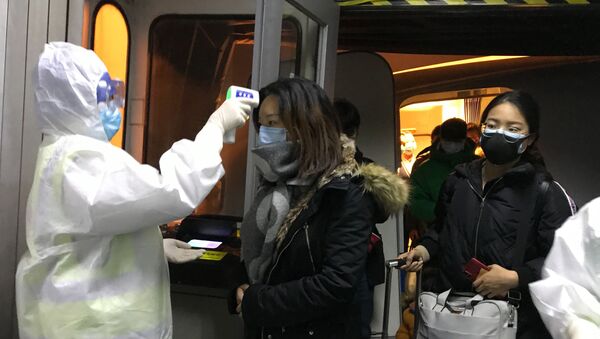After Taipei banned a children’s book from the mainland about China’s struggle to contain the COVID-19 outbreak in Wuhan earlier this year, Beijing fired back, accusing Taiwan’s ruling Democratic Progressive Party (DPP) of having an “anti-China syndrome.”
Earlier this month, the Taiwanese Ministry of Culture banned the book “Waiting for Dad to Come Home,” a picture book originally printed on the Chinese mainland but subsequently reprinted by a Taiwanese publisher.
The book tells the story of a Chinese boy in Wuhan whose father is a doctor. After he is sent to treat COVID-19 patients at the hospital, he is unable to spend the Lunar New Year holiday with his family. His mother teaches him about the responsibility of medics and the need to combat the virus, and they later visit his dad in the hospital - separated by a glass wall, of course. The son tells the father he supports him and will wait for him to come home.
It’s a real situation that unfolded in China this past January, when the Chinese government made the tough decision to cancel the huge traditional Lunar New Year celebrations on January 25 in a bid to stem the spread of the newly identified SARS-CoV-2 virus. Tens of thousands of doctors from across China, including in the People’s Liberation Army, mobilized to go to Hubei to treat sufferers of the new disease, and construction crews worked around the clock to build new hospitals in just a matter of days.
According to Taiwan’s Central News Agency (CNA), furor surrounding the book erupted late last month when Chen E-jun, a Taipei city councilor, denounced the book as Chinese propaganda. She noted that the words “Go China” and “Go Wuhan” appear on pages of the book, as do pictures of Chinese military aircraft.
"This children's book highlights the fact that the Chinese government is rewriting history, burying the truth about this global health crisis and shirking responsibility for the pandemic," Chen said, according to CNA.
Soon, DPP legislators found out about the book and got it removed from public libraries across the country, and the Ministry of Culture banned the book, saying its publishers had not received the necessary permits to print books originally printed in the mainland.
Zhu Fenglian, spokesperson for China’s Taiwan Affairs Office, told China Global Television Network on Wednesday the move reflected an "anti-China syndrome" that made some Taiwanese leaders fear anything from the mainland.
"I just don't understand why some people in Taiwan use a book, which plants the seeds of love and courage in the hearts of children, helping them know the meaning of mutual support, as the weapon to attack the Chinese mainland," Zhu said.
"They politicize and stigmatize anything related to the mainland, trying to stir up 'anti-China' sensations on the island. What are they afraid of? They are afraid that people on both sides of the Taiwan Straits will get closer to each other. They are afraid that people in Taiwan will know the real situation on the mainland, and the lies they've worked so hard to fabricate will be exposed. But such an unconscionable operation is doomed to fail,” she added.
Taiwan is formally known as the Republic of China, the last remnant of the Chinese government that ruled the entire country from 1912 until 1949, when it was defeated by the communist Red Army on the mainland and the People’s Republic of China was founded in Beijing. Both governments claim to be the sole legitimate representative of the Chinese people, but all but a couple nations have switched their recognition from Taipei to Beijing in the decades since the civil war ended.
Relations between the two governments have remained tense, as Beijing regards Taiwan as a rebellious province, and the United States has vastly increased the military support it passes to Taiwan, despite strong objections from the mainland.


